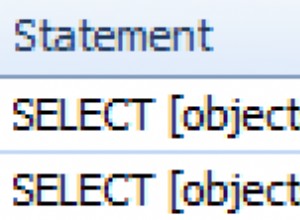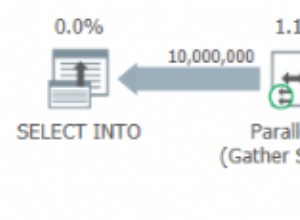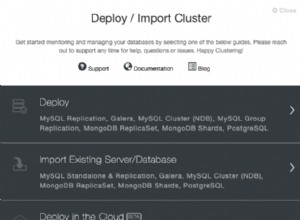Supponendo che le tue 7 tabelle siano collegate da ID, fai qualcosa del genere
Prima domanda
'SELECT * FROM table_a WHERE a_id IN (12,233,4545,67676,898999)'
// store the result in $result_of_first_query
Quindi fai un foreach e scegli gli ID che desideri utilizzare nella query successiva in una variabile separata da virgole (csv)
foreach($result_of_first_query as $a_row_from_first_table)
{
$csv_for_second_query = $csv_for_second_query.$a_row_from_first_table['b_id'].",";
}
$csv_for_second_query = trim($csv_for_second_query,", "); // problem is we will have a lot of duplicate entries
$temp_arr = array(); // so lets remove the duplicates
$temp_arr = explode(",",$csv_for_second_query); // explode values in array
$temp_arr = array_unique($temp_arr); // remove duplicates
$csv_for_second_query = implode(",",$temp_arr); // create csv string again. ready!
ora per la tua seconda tabella, otterrai, con una sola query, tutti i valori di cui hai bisogno per JOIN (non da mysql, lo faremo con php)
Seconda domanda
'SELECT * FROM table_b where a_id IN ('.$csv_for_second_query.')'
// store the result in $result_of_second_query;
Quindi dobbiamo solo unire a livello di codice i due array.
$result_a_and_b = array(); // we will store the joined result of every row here
// lets scan every row from first table
foreach($result_of_first_query as $inc=> $a_row_from_first_table)
{
// assign every row from frist table to result_a_and_b
$result_a_and_b[$inc]['a']=$a_row_from_first_table;
$inc_b=0; // counter for the joins that will happen by data from second table
// for every row from first table we will scan every row from second table
// so we need this nested foreach
foreach($result_of_second_query as $a_row_from_second_table)
{
// are data need to join? if yes then do so! :)
if($a_row_from_first_table['a_id']==$a_row_from_second_table['a_id'])
{
$result_a_and_b[$inc]['b'][$inc_b]=$a_row_from_second_table; // "join" in our "own" way :)
++$inc_b; // needed for the next join
}
}
}
ora abbiamo l'array $result_a_and_b con questo formato:
$result_a_and_b[INDEX]['a']
$result_a_and_b[INDEX]['b'][INDEX]
quindi con 2 query, abbiamo un risultato simile a TABLE_A_ROWS_NUMBER + 1 (una è la query iniziale della prima tabella)
In questo modo continua a fare tutti i livelli che vuoi.
- Interroga il database con l'id che collega la tabella
- ottenere gli ID nella stringa CSV
- esegui una query in modo successivo utilizzando WHERE id IN(11,22,33,44,55,.....)
- Unisciti a livello di codice
Suggerimento:puoi usare unset() per liberare memoria sulle variabili temporanee.
Credo di aver risposto alla tua domanda "C'è un modo per non interrogare il database così spesso?"
nota:codice non testato per errori di battitura, forse ho perso una virgola o due -o forse no
credo che tu possa ottenere il punto :) spero che aiuti!




